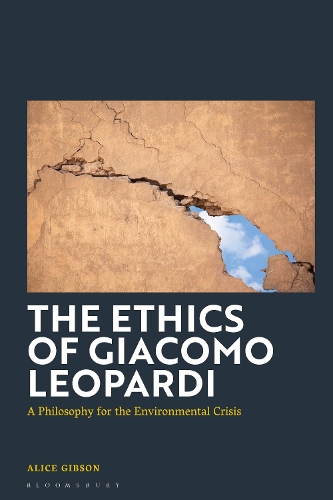
The Ethics of Giacomo Leopardi: A Philosophy for the Environmental Crisis
(Paperback)
Available Formats
Publishing Details
The Ethics of Giacomo Leopardi: A Philosophy for the Environmental Crisis
By (Author) Alice Gibson
Bloomsbury Publishing PLC
Bloomsbury Academic
29th May 2025
United Kingdom
Classifications
Tertiary Education
Non Fiction
Environmentalist thought and ideology
Literary studies: c 1800 to c 1900
170
Physical Properties
Paperback
256
Width 138mm, Height 216mm, Spine 14mm
320g
Description
Providing a comprehensive introduction to the work of pioneering poet-philosopher Giacomo Leopardi, Alice Gibson pushes his thought into new directions by investigating how his ethics and philosophy of nature offer means for understanding and taking responsibility for the environmental crisis. Through examination of the whole of Leopardis oeuvre, from the Zibaldone to the poems he wrote towards the end of his life, this book disrupts the common image of Leopardi as a pessimist poet whose works contribute to the nihilistic tradition. The Ethics of Giacomo Leopardi instead uncovers his forward-looking views on living in a multispecies world, in which humans live alongside other living beings in a delicate ecosystem that not only requires respect, but also instigates wonder. Bringing Leopardis thought into dialogue with contemporary ecological theorists such as Donna Haraway, Bruno Latour, and Timothy Morton, Gibson reveals how a Leopardian ethics of solidarity, compassion and community is the guide we need today to reframe our relationship with nature.
Reviews
This is a beautifully written book which, contrary to readings of Giacomo Leopardi which portray him as a pessimist, undertakes the task of reconstructing his ethical project by highlighting the affirmative politics of sharing, flourishing and sociality that underpins his work. In doing so, this research adopts a new vantage point for looking both at key ethical categories and our human fragility as a response to the theoretical and political challenges imposed by the environmental catastrophe that characterizes our time. * German E. Primera, Senior Lecturer in Philosophy and Critical Theory, University of Brighton, UK *
An excellent contribution to Leopardi Studies, and to the current debate over ecological theory. Gibson eloquently and passionately assesses Leopardis discourse over nature, human neglect and irresponsibility in the modern world, and convincingly declares it as profoundly poignant and relevant for our present and future. * Emanuella Tandello, Professor Emerita of Italian Language and Literature, Christ Church, University of Oxford, UK *
Gibson makes a compelling case for Leopardi's prescient critique of the illusion of human planetary power informing both anthropocene discourse and its environmentalist critique. Her Leopardi advocates an ethics of human solidarity in fragility in the face of a planet indifferent to its survival or extinction. Her book demands a fundamental rethinking of the assumptions informing our environmental ethics and activism. * Howard Caygill, Professor of Modern European Philosophy at the Centre for Research in Modern European Philosophy, Kingston University, UK *
Author Bio
Alice Gibson completed a PhD in Philosophy at the Centre for Research in Modern European Philosophy, Kingston University, UK. She is currently Research Publications Officer at London School of Hygiene and Tropical Medicine, UK.
